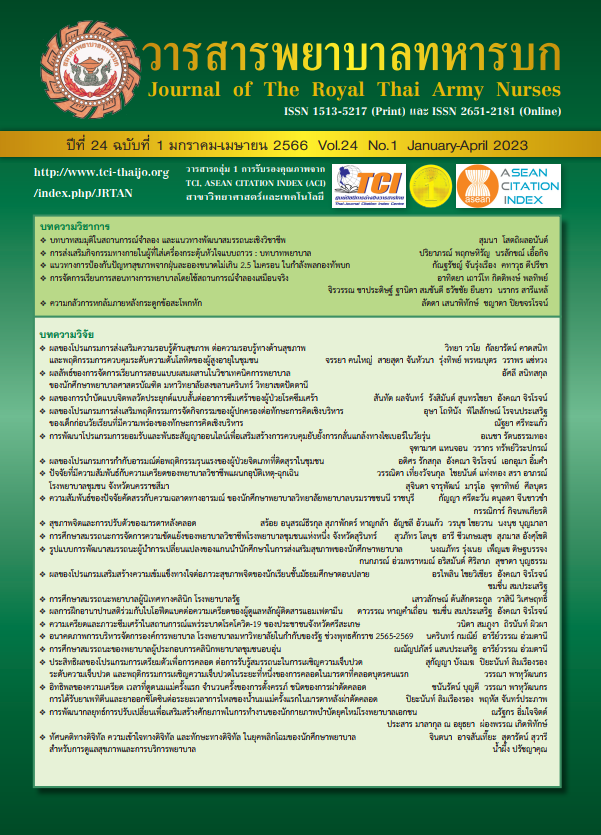The Effect of a Mental Strengthening Program on the Mental Health State of High School Students
Keywords:
the mental strengthening program, mental health state, high school studentsAbstract
The purpose of this Quasi-experimental research was to examine the effect of a mental strengthening program on the mental health state of high school students in Phathum Thani Province, Thailand during 2020. The sample consisted of 60 high school students, recruited using the inclusion criteria. They were randomly assigned to the control and experimental groups, with 30 subjects in each group. The experimental group participated in the mental strengthening program. Their activities comprised 10 sessions, for a period of five weeks, while the control group was treated normally. The mental health state scores were measured using the Depression Anxiety Stress Scales (DASS-21: Thai version) before and after participating in the mental strengthening program. The data were analyzed using descriptive statistics, dependent t-test, and independent t-test.
The results of the study were as follows.
1) After participating in the mental strengthening program, the mean score for depression, anxiety and stress of the students was lower than their mean score on their pretest at a statistical significance .001 level.
2) The mean difference between pretest and posttest depression anxiety and stress score of the experiment group was significantly greater than that of the control group at a statistical significance .001 level. Nurses play a vital role in promoting and developing mental strengthening for high school students. The students will be prepared to eventuality deal with stress anxiety and depression, thus preventing mental health problems in the future.
Downloads
References
Powwattana A, Auemaneekul N, Lagampan S. Risk behaviors prevention in adolescence: concepts and management in multilevel approach. Bangkok: Danex intercorporation company limited; 2018. (in Thai)
Veit CT, Ware JE, Jr. The structure of psychological distress and well-being in general populations. Journal of Consulting and Clinical Psychology. 1983;51(5):730-42.
Department of Mental Health Ministry of Public Health. Annual report 2018. Bankok: Inspire House Company Limited; 2018. (in Thai)
Varcarolis EM. Essentials of psychiatric mental health nursing: A communication approach to evidence-based care. St. Louis, Missouri: Elsevier/Saunders; 2013.
Videbeck SL. Psychiatric-mental health nursing. 6th ed. Philadelphia: Wolters Kluwer Health/ Lippincott Williams & Wilkins; 2014.
Chanralaksana N, Thaweekoon T, Sangon S. Factors predicting depression in secondary school students. The Journal of Psychiatric Nursing and Mental Health. 2015;29(2):128-43. (in Thai)
Nintachan P, Vanaleesin S, Sanseeha L, Thummathai K, Orathai P. Resilience and Thai youth risk behavior. Ramathibodi Nursing Journal. 2011;17(3):430-43. (in Thai)
Sangon S, Nintachan P, Thaweekoon T. Resilience and depression of people in a community in Phathumthani province. The Journal of Psychiatric Nursing and Mental Health. 2018;32(2):84-99. (in Thai)
Grotberg EH. A guide to promoting resilience in children: Strengthening the human spirit. The Hague The Netherlands: Bernard van Leer Foundation; 1995.
Grotberg EH. Resilience for today: Gaining strength from adversity. Westport, CT: Praeger; 2003.
Huannet P, Dangdomyouth P, Upasen R. The Effect of resilience enhancement program on self-esteem of depressive patients. The Journal of Psychiatric Nursing and Mental Health. 2018;32(2):39-51. (in Thai)
Chaosaunsreecharoen P, Chaosuansreecharoen KR, Khongsanit S. Effectiveness of a resilience- enhancing program on resilience, self-esteem, emotional quotient and academic achievement motivation among 1st-year students at Sirindhorn College of Public Health, Trang. Journal of Nursing, Public Health, and Education. 2019;20(2): 16-30. (in Thai)
Sangsanguan W. The effectiveness of resilience enhancement program by using problembased leaning in undergraduate nursing students. Journal of The Royal Thai Army Nurses. 2019;20(2):186-94. (in Thai)
Seangsanaoh S, Vatanasin D, Hengudomsub P, Pratoomsri W. The influence of interpersonal factors on depression among late adolescents. Journal of Boromarajonani College of Nursing. 2017;33(3):59-69. (in Thai)
Saisuwan W, Nintachan P, Sangon S, Ekathikhomkit N. Relationships between family functioning, sense of belonging, perceived stress and resilience in Thai disadvantaged adolescents in a province in the Northern region. The Journal of Psychiatric Nursing and Mental Health. 2020;34(1):61-85. (in Thai)
Sriprasarn C, Wacharasin C, Hengudomsub P. Feasibility of enhancing happiness and resilience family-based program on depressive symptom among adolescents. Journal of The Royal Thai Army Nurses. 2018;19 (Supplement). (in Thai)
Jornburom Y. Effect of the resillience enhancement program on reduced stress of students secondary school. Journal of Nursing Division. 2017;44(1):103-15. (in Thai)
Chirak W, Nintanchan P, Taweekoon T. The effect of the resilience enhancing program on depression and resilience of nursing students in a nursing college in the Northeast region of Thailand. The Journal of Psychiatric Nursing and Mental Health. 2015;29(3):42-60. (in Thai)
Oei TPS, Sawang S, Goh YW, Mukhtar F. Using the depression anxiety stress scale 21 (DASS-21) across cultures. International Journal of Psychology. 2013;48(6):1018-29.
Balgiu B. Self-esteem, personality and resilience. Study of a students emerging adults group. Journal of Educational Science and Psychology. 2017;VII(LXIX):93-9.
Ruchiwit M. Stress management for promoting mental health. 2nded. Bangkok: Thammasat Printing House; 2013. (in Thai)
Suwannaboon W, Puapan S, Thanee S, Dallad J. The effects of interpersonal group therapy on quality of life among Shizophrenic patients. The Journal of Faculty of Nursing Burapha University. 2015;23(1):68-79. (in Thai)
Sriprasarn C, Wacharasin C, Hengudomsub P. Feasibility of Enhancing Happiness and Resilience Family-Based Program on Depressive Symptoms among Adolescents. Journal of The Royal Thai Army Nurses. 2018; 19:279-88. (in Thai)
Downloads
Published
How to Cite
Issue
Section
License
Copyright (c) 2023 Journal of The Royal Thai Army Nurses

This work is licensed under a Creative Commons Attribution-NonCommercial-NoDerivatives 4.0 International License.
บทความหรือข้อคิดเห็นใดใดที่ปรากฏในวารสารพยาบาลทหารบกเป็นวรรณกรรมของผู้เขียน ซึ่งบรรณาธิการหรือสมาคมพยาบาลทหารบก ไม่จำเป็นต้องเห็นด้วย
บทความที่ได้รับการตีพิมพ์เป็นลิขสิทธิ์ของวารสารพยาบาลทหารบก
The ideas and opinions expressed in the Journal of The Royal Thai Army Nurses are those of the authors and not necessarily those
of the editor or Royal Thai Army Nurses Association.






